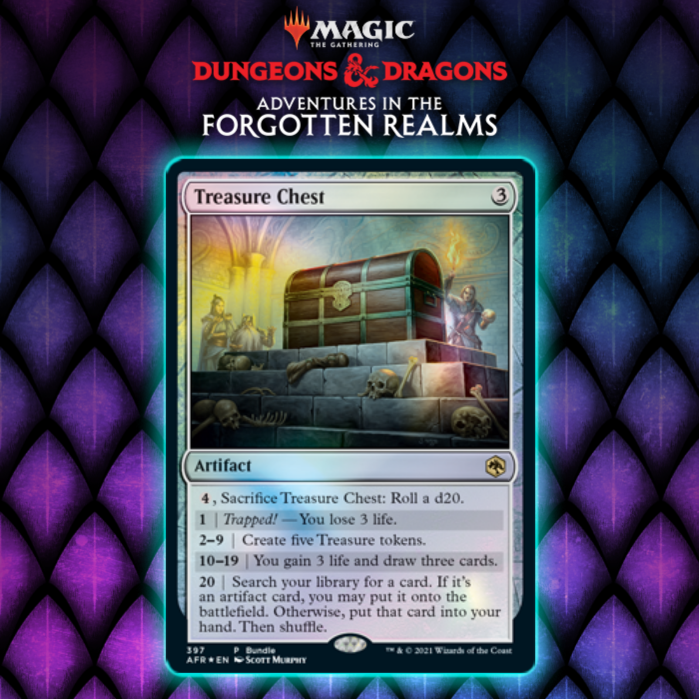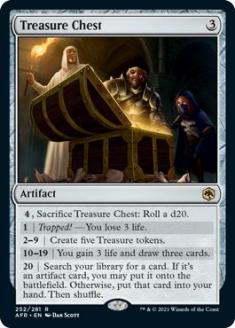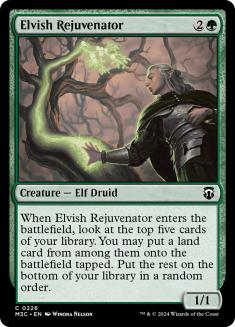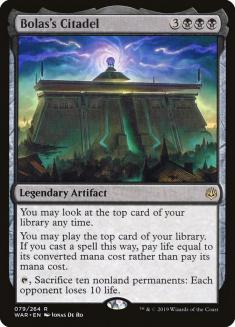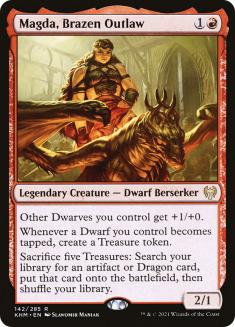Treasure Chest introduces the “Roll a d20” mechanic to (black border) Magic.
This thematic mechanic introduces a lot of potential variance into a game in a way that I think players might react to fairly differently than what we’re used to with coin flip cards. Here, we have a card that does something pretty good 95% of the time, but 5% of the time it’s game-losingly disastrous. When you play a coin flip card, you know you’re signing up to have it fail half the time, but here, when it fails, you got exceptionally unlucky. This isn’t the first time we’ve seen this. Rolling a 1 on Treasure Chest is roughly comparable in result and probability to missing a land with Elvish Rejuvenator.
On the one hand, it’s weird to intentionally design that; missing has always felt more like a bug in the design of Elvish Rejuvenator that stops it from being a perfect workaround to the clunkiness of searching your library (a fixed design, if you’re trying to “fix it” might be cascading into a land), but here, they’ve gone out of their way to include that whammy. Obviously, this is for thematic reasons. Critical failures are a big part of D&D, but how will it translate to Magic?
I think a lot of players are going to hate it, or at least complain about it, but I also think that for a substantial portion of them, it’ll make them have more fun even while they’re saying they hate it. The risk makes it a lot more satisfying whenever it works, and the failures offer a lot of complaint equity. Nobody likes rolling a 1, but it’s probably net fun that it’s possible.
So how good is Treasure Chest, and is it 95% as good as it would be if it didn’t have the possibility of failure?
Well, no, I think it’s worse than that. I try to play cards and strategies that are relatively resilient or unexploitable, and if my card has the “I might get unlucky” exploit, I’m certainly creating an unnecessary opportunity to lose, so to me, the cost should be considered a little more than 5%, but if not roughly 5%, then how much? Surely it’s an actual amount; a card isn’t unplayable just because it might not work. I don’t have a good mathematical justification for how much weaker I should consider this card than if it didn’t have the possibility of failure. My gut says maybe call it around 10% weaker, but that’s pretty arbitrary.
Anyway, X% weaker doesn’t mean anything without knowing how strong its baseline is. So, is the juice worth the squeeze here?
The card is roughly a coin flip between “make five Treasure tokens” and “gain three life and draw three cards.” Really, it’s only 40% to make Treasure, 50% to draw cards, and 10% to either be great or terrible. It’s unfortunate that making Treasure tokens is less likely, since it’s often the better outcome.
So what are we doing with this?
Fittingly, Treasure Chest only offers means to an end; it gives you resources, which let you use other cards, rather than doing something that can win a game itself, much like a treasure chest generally contains goods that you exchange for your actual goal. We need to figure out how best to use these resources. The first thing to do is optimize for that 20. We don’t want to roll the big prize and have nothing to show for it.
My first thought is Bolas’s Citadel. This isn’t legal in Standard, so we’d most likely be thinking about Historic. Cheating Bolas’s Citadel onto the battlefield is a pretty solid gameplan, but it’s hard to build a deck around a 5% chance that that happens, especially when the card is equally likely to do nothing but hurt you.
Well, if you have Magda, Brazen Outlaw, you can directly convert exactly five Treasure tokens into the exact result of rolling a 20 if you’re looking for an artifact in both cases. That’s like rigging the die to get a 45% chance of a Tinker instead of a 5% chance, and with Magda, you could also include a Dragon or two that you might want to search for instead. Sow what about the other 50% of the time, when you just get three life and three cards?
Honestly, that part’s pretty bad. Seven mana to draw three is just pretty steep, I can’t deny it and there’s no real way around it. If you’re playing a competitive game of Standard or Historic, 50% of the time at least, this card isn’t going to do enough to justify the time and mana you put into it. That’s for the best. As much as I can believe that the possibility of rolling a 1 can make this card more exciting, I’d hate to see a lot of tournaments come down to variance that’s so blatantly front-loaded.
In Limited, you’ll generally prefer to draw three cards and gain three life to making five Treasure tokens, and there that payoff will often be worth seven mana, but only if you can also use the potential Treasure or tutoring. I suspect Treasure Chest will be playable, but far from a bomb, and not something you should often first-pick in a draft.
I think this card is best-suited to Commander, and I don’t just mean that to say, “It’s a cool card, but not good enough, yet I’m sure Commander players like it; they’ll play anything.” I mean I think it’s actually interesting in that format.
First, it’s fun in a way that I think is valuable, particularly since Commander is explicitly about building an experience, but also, I think you could build a deck that really leans into taking advantage of it.
I’m thinking a commander like Magda, Brazen Outlaw or Daretti, Scrap Savant that pairs it with cards like Goblin Welder and Trading Post. If you can use the Treasure tokens to recur the Chest, you have an engine that rewards you with a mix of mana / objects and cards / life.
Treasure Chest is easy to imagine as an “also-ran” source of extra mana or cards for colors that don’t have easy access to that like red and white, and I’m not that into it in that context (I’d rather have a Druidic Satchel), but thinking about building an engine around opening Treasure Chest over and over is the kind of fun nonsense I could get into in Commander.
Will this be an all-star? Absolutely not, but that’s a big selling point for me as a Commander card, and I imagine I’m not alone in prioritizing cards that are different from what other people are playing. Treasure Chest offers a great opportunity to impress people with your ability to make the most of a chaotic result (and blame the die if it doesn’t work out).

